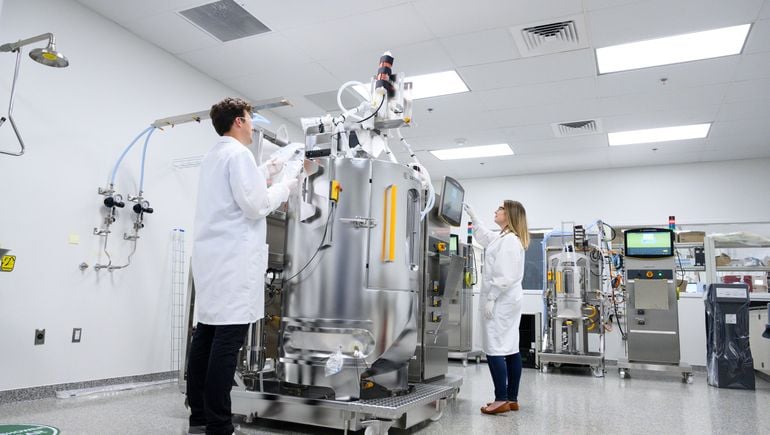
Shares of UniQure lost more than a third of their value Wednesday morning after the Netherlands-based biotechnology company announced mixed results from a key study testing one of its most closely watched experimental medicines.
Known as AMT-130, the medicine is a gene therapy meant to treat Huntington’s disease, a rare, nerve-destroying disorder that progressively impairs a person’s ability to move and think. Huntington’s is caused by mutations in the gene responsible for making the similarly named “huntingtin” protein. Research indicates this protein normally helps brain function; but in its mutant form, it bunches together into toxic aggregates that damage nerve cells.
UniQure designed AMT-130 to silence the malfunctioning huntingtin gene, but how well it does isn’t fully clear.
Last year, the company gave a glimpse at some early results from its study. The small clinical trial, which tested two doses of AMT-130, found that a year after treatment, mutant huntingtin in participants given the lower dose had declined about 50%.
Yet, the new data presented show mutant protein levels in this group had rebounded by the two-year mark and were only 8% below where they had started. Durability, or how long a treatment stays effective, has been one of the main questions facing gene therapies currently in development, including AMT-130.
Researchers also found that mutant protein levels were far more variable in the trial’s higher dose arm, where they increased by 40% one year after treatment.
Paul Matteis, an analyst at the investment firm Stifel, called the mutant huntingtin results “confusing” in a note to clients.
“There are multiple possible explanations for the oddities,” Matteis wrote. “[T]hat said, we do think it hurts a potential near-term path forward for the stock” and, possibly, an accelerated path to market for AMT-130.
On a call with investors, UniQure executives said they remain confident in their therapy despite the data on mutant huntingtin, which can be complicated to measure. They also highlighted how, compared to “natural history” data, which focuses on how a disease progresses without treatment, both doses of AMT-130 appeared to benefit patients on several scoring systems used to evaluate the severity of Huntington’s symptoms.
Additionally, the lower-dose arm of UniQure’s study experienced decreases in neurofilament light chain — a molecule that, according to some research, is indicative of brain and nervous damage. Two years after treatment, levels had declined 13%, a substantial difference from the 23% increase seen in the natural history data.
Neurofilament light chain levels in the high-dose group, meanwhile, had increased an average of 52% one year after treatment with AMT-130.
Regarding safety, UniQure said patients generally tolerated its therapy well. The company previously reported two serious adverse events in the low-dose group that were unrelated to AMT-130, along with one in the high-dose group and another in the study’s control arm. There were two “suspected unexpected serious adverse events” in the high dose arm as well: a case of severe headache, and a case of central nervous system inflammation.
UniQure said all these events have resolved.
By the end of the year, UniQure intends to start a third cohort of up to 10 patients in its trial, to “further investigate both doses in combination with perioperative immunosuppression with a focus on evaluating near-term safety.” The company is also running a study of AMT-130 in Europe, and anticipates completing patient enrollment in the high-dose cohort early in the third quarter.
By early next year, UniQure plans to meet with regulators to discuss both the data from the U.S. and European studies and the path forward for AMT-130.
“Overall, [the] data is not perfect,” wrote RBC Capital Markets analyst Luca Issi in a note to clients, “but we are encouraged by the functional data and like that [UniQure] is planning to engage the regulators soon.”
Investors may not be as optimistic, as UniQure’s share price had tumbled 38% by late Wednesday morning, to trade at around $12.
Notably, the New Jersey-based drugmaker PTC Therapeutics also disclosed new Huntington’s data on Wednesday. The company is developing an oral medicine meant to decrease the production of mutated huntingtin protein, and, according to interim results from a mid-stage trial, patients on a 10 mg dose experienced an average 30% reduction.
- SEO Powered Content & PR Distribution. Get Amplified Today.
- EVM Finance. Unified Interface for Decentralized Finance. Access Here.
- Quantum Media Group. IR/PR Amplified. Access Here.
- PlatoAiStream. Web3 Data Intelligence. Knowledge Amplified. Access Here.
- Source: https://www.biopharmadive.com/news/uniqure-huntingtons-gene-therapy-results/653524/



